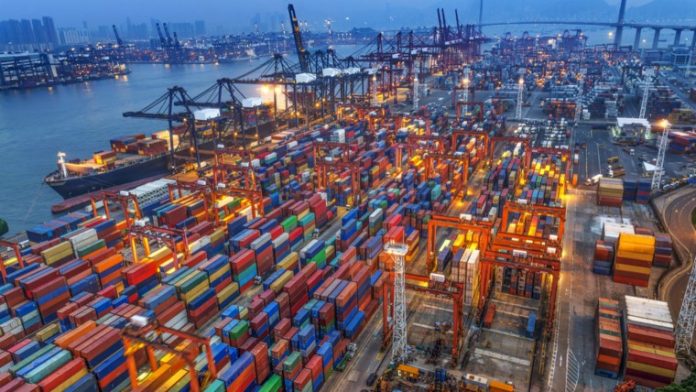KARACHI
Despite all efforts by the government to enhance exports in 2016-17, the country’s goods export declined by 1.63 per cent to $20.448 billion in (July-June) 2016-17 from $20.787 billion in the same period last year, the data released by the Pakistan Bureau of Statistic (PBS) here on Tuesday.
In last two years, the country exports had declined by 15.75 per cent from $23.667 billion in 2014-15.
The ministry of finance announced several exports’ incentives this year, but none of them was implemented including Rs 180 billion package to the textile industry, which was announced in January 2017.
The federal government has set a target of $35 billion till 2018, but the analysts or the businessmen claimed the government’s export target is not achievable in such circumstances.
In the recently announced budget for 2017-18, the finance ministry was set to give some major incentives of rebate and Zero-rated Sales Tax, to top five important textile sectors, for enhanced exports of their products, but Ishaq Dar did not announce any of these incentives in his budget speech.
These five sectors’ export almost halves the total goods export from Pakistan especially to European Union (EU), America and other countries.
“The exports of the country are in-line with the expectations as we were expecting the goods exports of the last fiscal year in between $20-$21 billion,” the analyst said. “The exports are almost $21 billion while the imports have gone down only by 18.67 per cent in last fiscal year. The exports receipts are not enough to keep government’s External Account stable. Overseas Pakistani workers remitted $19,304 billion in fiscal year 2016-17 down by 3.1 per cent or $610 million, compared with $19.917 billion received during the same period in the preceding year,” the analyst added.
However, the businessmen said that Trade Development Authority of Pakistan (TDAP) did nothing last year except to hold some exhibition in Tajikistan and other Russian states.
Punjab and Sindh were still facing the worst power and gas shortage. After a hue and cry of the business communities, the government provided some relief to the industry by importing Liquified Natural Gas (LNG). The government’s initiatives to import LNG fulfilled some demand of industrial sector in the last fiscal year, but it failed to provide gas and electricity to the industries.
On Month-on-Month basis, the country’s exports increased by 17.52 per cent and stood at $1.912 billion in June 2017 compared to $1.627 billion in May 2017, PBS data revealed. However, on year-on year basis, the exports declined by 16.16 per cent in June 2017 compared to $1.646 billion in June 2016.
Meanwhile, country’s total imports surged by 18.67 per cent to $53.026 billion during July-June 2016-17 from $44.685 billion in the same period last year.
On Year-on-Year basis, imports surged by 2.16 per cent to $4.534 billion in June 2017 while it was at $4.438 billion in June 2016. On month on month basis, the imports of the country decreased by 10.96 per cent to $4.534 billion in June 2017 compared $5.029 billion in May 2017.
The trade deficit in July-June 2016-17 enhanced by 36.32 per cent to $32.578 billion from $23.898 billion in the same period last year. In June 2017, trade deficit declined by 24.33 per cent on MoM basis due to increasing exports and declining imports, while on year on year, it decreased by 6.09 per cent.
According to the market experts, five major export oriented sectors were given Zero rated Sales Tax regime to facilitate export-oriented industry and this decision of the government was not welcomed by the textile industry and its trade bodies. It is being hoped that the textile export will increase in 2017-18, they added.
The federal government is doing nothing for the export-oriented sectors, a textile businessman said. The measures taken by the government can promote the country’s exports which are stagnant since long time, a businessman said.
If the government seriously implemented business plan as proposed by the textile industry and other export oriented sectors, the country’s exports could increase manifold in last fiscal year, he added.
An analyst said, “The government could not boost the overall exports this year, while imports figures have touched all-time high.” The commerce ministry through the State Bank had imposed cash margin condition on the import of CBU cars and other luxurious products, but the trade figures show “there is no impact of it on country’s import,” he added.
The government claims that the imports increased only because of the textile machineries and other machineries under the agreement of China Pakistan Economic Corridor (CPEC).




